2022年中考英语——时态重点讲解 课件(共16张PPT)
文档属性
| 名称 | 2022年中考英语——时态重点讲解 课件(共16张PPT) | 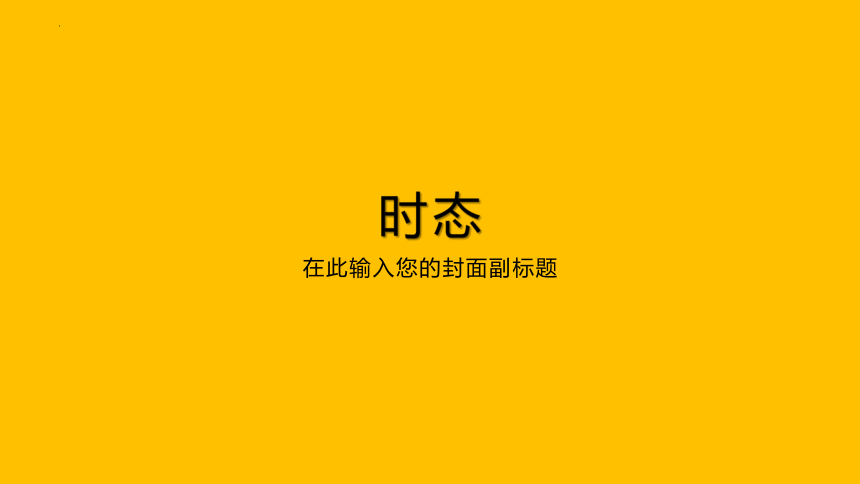 | |
| 格式 | pptx | ||
| 文件大小 | 121.5KB | ||
| 资源类型 | 教案 | ||
| 版本资源 | 通用版 | ||
| 科目 | 英语 | ||
| 更新时间 | 2022-04-12 17:40:59 | ||
图片预览

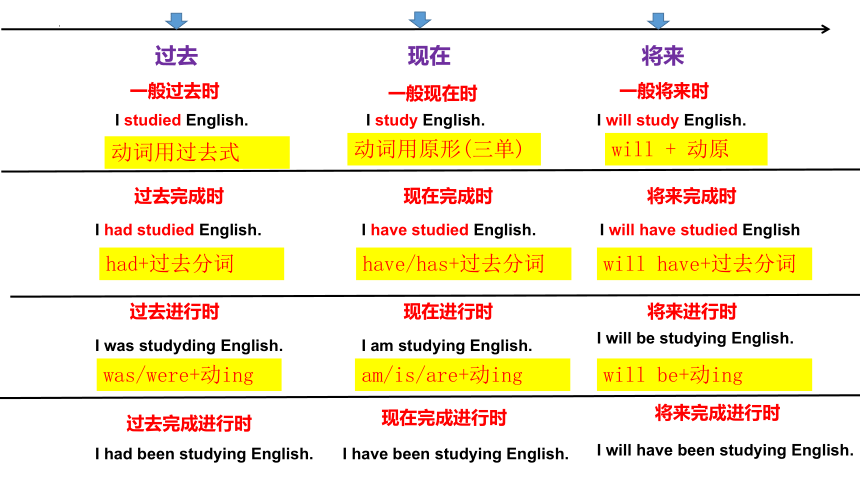
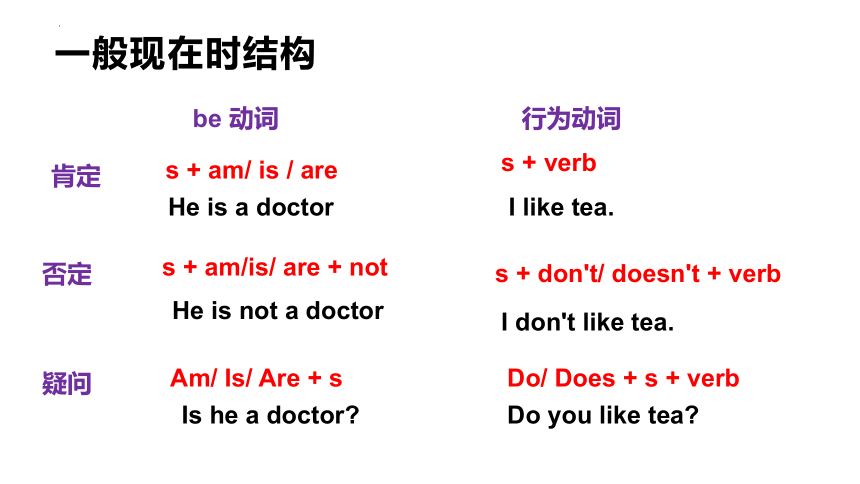

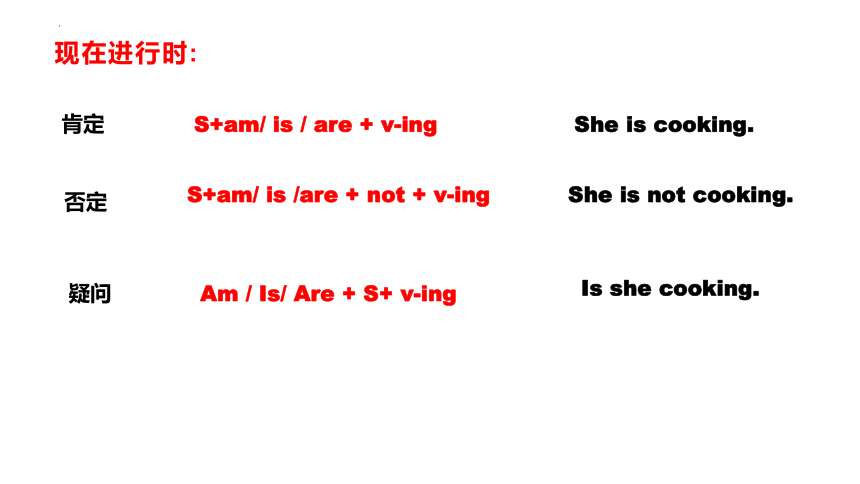
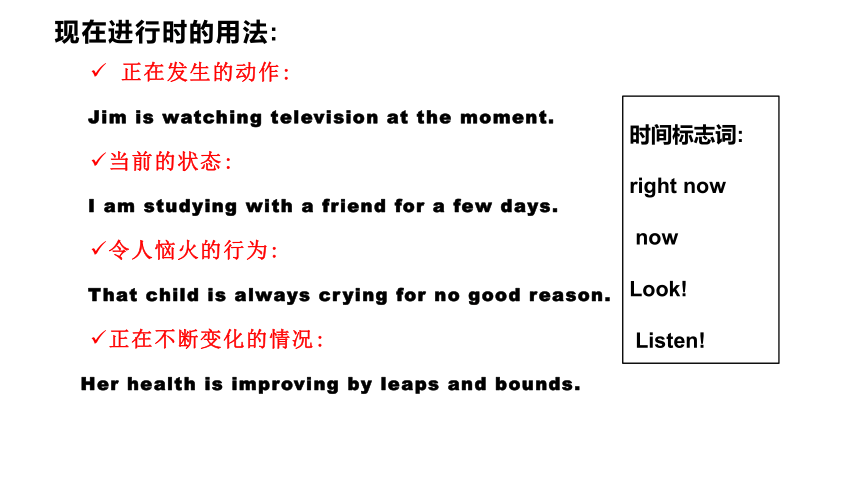
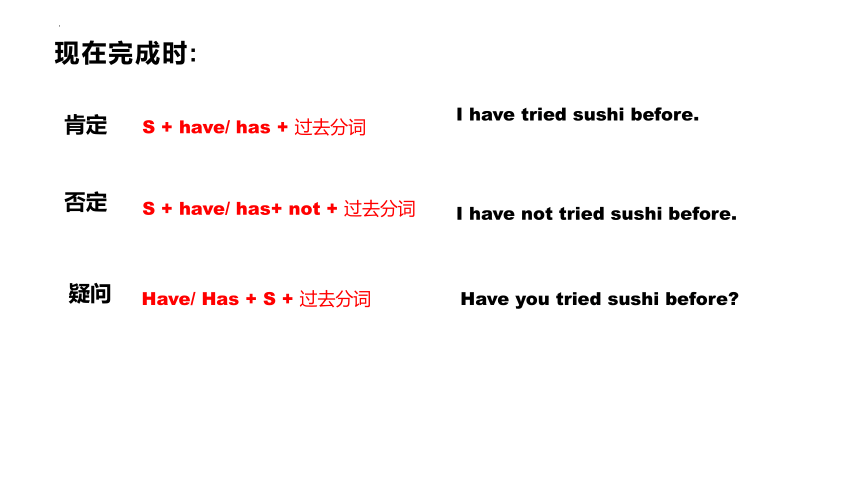
文档简介
(共16张PPT)
时态
在此输入您的封面副标题
过去
现在
将来
一般过去时
一般现在时
一般将来时
I studied English.
I study English.
I will study English.
过去完成时
现在完成时
将来完成时
I had studied English.
I have studied English.
I will have studied English
过去进行时
现在进行时
将来进行时
I was studyding English.
I am studying English.
I will be studying English.
过去完成进行时
现在完成进行时
将来完成进行时
I had been studying English.
I have been studying English.
I will have been studying English.
动词用过去式
动词用原形(三单)
will + 动原
had+过去分词
have/has+过去分词
will have+过去分词
was/were+动ing
am/is/are+动ing
will be+动ing
一般现在时结构
be 动词
行为动词
肯定
s + am/ is / are
s + verb
He is a doctor
I like tea.
否定
s + am/is/ are + not
He is not a doctor
s + don't/ doesn't + verb
I don't like tea.
疑问
Am/ Is/ Are + s
Do/ Does + s + verb
Is he a doctor
Do you like tea
一般现在时用法:
表示经常发生,反复发生的动作
描述客观真理
表示内心活动和感情等
I do my homework every night.
Light travels faster than sound.
I don't think you are right.
时间标志词:
never; seldom; sometimes; often; usually; always
at weekends/at the weekend/ on weekdays
in the morning/afternoon/evening
every day/week/month/year
现在进行时:
肯定
否定
疑问
S+am/ is / are + v-ing
S+am/ is /are + not + v-ing
Am / Is/ Are + S+ v-ing
She is cooking.
She is not cooking.
Is she cooking.
现在进行时的用法:
正在发生的动作:
Jim is watching television at the moment.
当前的状态:
I am studying with a friend for a few days.
令人恼火的行为:
That child is always crying for no good reason.
正在不断变化的情况:
Her health is improving by leaps and bounds.
时间标志词:
right now
now
Look!
Listen!
现在完成时:
肯定
否定
疑问
S + have/ has + 过去分词
S + have/ has+ not + 过去分词
Have/ Has + S + 过去分词
I have tried sushi before.
I have not tried sushi before.
Have you tried sushi before
现在完成时的用法:
之前去过的地方:
I have been to England.
做了几次的事情:
I have been to Paris three times.
已经完成的动作但对现在依然产生重要的影响:
I have already lost my job.
动作发生在过去并且一直延续到现在:
I have known Janes for four or five years.
时间标志词:
so far
till now/up to now
since then/ ever since
already/yet/
once/twice/many times
during the last century
in the past few years
for over ten years
over the years
一般过去时
be 动词
行为动词
肯定
s + was/were
s + 动词过去式
He was a doctor
I liked tea.
否定
s + was/were+ not
He was not a doctor
s + didn't+ verb
I didn't like tea.
疑问
Was/Were + s
Did + s + verb
Was he a doctor
Did you like tea
一般过去时的用法
表示过去的某种状态
I was tired out when I woke up on the beach.
表示过去曾经发生或反复发生过的事情
I often took the school bus to school last year.
仅表示过去,和现在没有联系
I lived in Suzhou ten years ago.
时间标志词:
ago
yesterday/ the day before yesterday
last night/ week/ month
later in the afternoon
when I was young
just now
in 2016
once
过去进行时:
肯定
否定
疑问
S+was/were + v-ing
S+was/were + not + v-ing
Was/ Were + S+ v-ing
She was cooking.
She was not cooking.
Was she cooking.
过去进行时的用法:
时间标志词:
at that time
at that moment
just then
at nine o’clock last nightwhen I came inthis time yesterday
表示过去的某个时候正在进行的动作或持续的状
I was working on my lessons at that time.
表示过去某个阶段一直在进行的动作
They were doing homework the whole morning.
过去完成时:
肯定
否定
疑问
S + had + 过去分词
S + had+ not + 过去分词
Had + S + 过去分词
He had planted two hundred trees before last weekend.
He had not planted two hundred trees before last weekend.
Had he planted two hundred trees before last weekend
过去完成时的用法:
叙述过去发生的事情, 在已叙述了的过去的事情之前:
I didn't konw a thing about verbs, for I had not studied my lesson.
常用在told, said, thought等后面接的宾语从句,表示主句所叙述的事情发生在从句之前
He said he had known her well.
一般将来时:
肯定
否定
疑问
S+will + 动原
S+be going to + 动原
S+will + not + 动原
S+be not going to + 动原
Will + S+ 动原
Be + S + gonig to + 动原
She will go to Beijing tomorrow
She won't go to Beijing tomorrow.
Will she go to Beijing tomorrow
一般将来时的用法:
表示将来的某个时候将要发生的事
She will see her friends off tomorrow.
表示打算或计划将来某个时候要做的事
I’m going to take a boat trip tomorrow.
时间标志词:
tomorrow
the day after tomorrownext Friday/ week/ month/ yeartonight/this evening/ weekendin ten days/ months/ yearsfrom now onin the futuresoon
时态
在此输入您的封面副标题
过去
现在
将来
一般过去时
一般现在时
一般将来时
I studied English.
I study English.
I will study English.
过去完成时
现在完成时
将来完成时
I had studied English.
I have studied English.
I will have studied English
过去进行时
现在进行时
将来进行时
I was studyding English.
I am studying English.
I will be studying English.
过去完成进行时
现在完成进行时
将来完成进行时
I had been studying English.
I have been studying English.
I will have been studying English.
动词用过去式
动词用原形(三单)
will + 动原
had+过去分词
have/has+过去分词
will have+过去分词
was/were+动ing
am/is/are+动ing
will be+动ing
一般现在时结构
be 动词
行为动词
肯定
s + am/ is / are
s + verb
He is a doctor
I like tea.
否定
s + am/is/ are + not
He is not a doctor
s + don't/ doesn't + verb
I don't like tea.
疑问
Am/ Is/ Are + s
Do/ Does + s + verb
Is he a doctor
Do you like tea
一般现在时用法:
表示经常发生,反复发生的动作
描述客观真理
表示内心活动和感情等
I do my homework every night.
Light travels faster than sound.
I don't think you are right.
时间标志词:
never; seldom; sometimes; often; usually; always
at weekends/at the weekend/ on weekdays
in the morning/afternoon/evening
every day/week/month/year
现在进行时:
肯定
否定
疑问
S+am/ is / are + v-ing
S+am/ is /are + not + v-ing
Am / Is/ Are + S+ v-ing
She is cooking.
She is not cooking.
Is she cooking.
现在进行时的用法:
正在发生的动作:
Jim is watching television at the moment.
当前的状态:
I am studying with a friend for a few days.
令人恼火的行为:
That child is always crying for no good reason.
正在不断变化的情况:
Her health is improving by leaps and bounds.
时间标志词:
right now
now
Look!
Listen!
现在完成时:
肯定
否定
疑问
S + have/ has + 过去分词
S + have/ has+ not + 过去分词
Have/ Has + S + 过去分词
I have tried sushi before.
I have not tried sushi before.
Have you tried sushi before
现在完成时的用法:
之前去过的地方:
I have been to England.
做了几次的事情:
I have been to Paris three times.
已经完成的动作但对现在依然产生重要的影响:
I have already lost my job.
动作发生在过去并且一直延续到现在:
I have known Janes for four or five years.
时间标志词:
so far
till now/up to now
since then/ ever since
already/yet/
once/twice/many times
during the last century
in the past few years
for over ten years
over the years
一般过去时
be 动词
行为动词
肯定
s + was/were
s + 动词过去式
He was a doctor
I liked tea.
否定
s + was/were+ not
He was not a doctor
s + didn't+ verb
I didn't like tea.
疑问
Was/Were + s
Did + s + verb
Was he a doctor
Did you like tea
一般过去时的用法
表示过去的某种状态
I was tired out when I woke up on the beach.
表示过去曾经发生或反复发生过的事情
I often took the school bus to school last year.
仅表示过去,和现在没有联系
I lived in Suzhou ten years ago.
时间标志词:
ago
yesterday/ the day before yesterday
last night/ week/ month
later in the afternoon
when I was young
just now
in 2016
once
过去进行时:
肯定
否定
疑问
S+was/were + v-ing
S+was/were + not + v-ing
Was/ Were + S+ v-ing
She was cooking.
She was not cooking.
Was she cooking.
过去进行时的用法:
时间标志词:
at that time
at that moment
just then
at nine o’clock last nightwhen I came inthis time yesterday
表示过去的某个时候正在进行的动作或持续的状
I was working on my lessons at that time.
表示过去某个阶段一直在进行的动作
They were doing homework the whole morning.
过去完成时:
肯定
否定
疑问
S + had + 过去分词
S + had+ not + 过去分词
Had + S + 过去分词
He had planted two hundred trees before last weekend.
He had not planted two hundred trees before last weekend.
Had he planted two hundred trees before last weekend
过去完成时的用法:
叙述过去发生的事情, 在已叙述了的过去的事情之前:
I didn't konw a thing about verbs, for I had not studied my lesson.
常用在told, said, thought等后面接的宾语从句,表示主句所叙述的事情发生在从句之前
He said he had known her well.
一般将来时:
肯定
否定
疑问
S+will + 动原
S+be going to + 动原
S+will + not + 动原
S+be not going to + 动原
Will + S+ 动原
Be + S + gonig to + 动原
She will go to Beijing tomorrow
She won't go to Beijing tomorrow.
Will she go to Beijing tomorrow
一般将来时的用法:
表示将来的某个时候将要发生的事
She will see her friends off tomorrow.
表示打算或计划将来某个时候要做的事
I’m going to take a boat trip tomorrow.
时间标志词:
tomorrow
the day after tomorrownext Friday/ week/ month/ yeartonight/this evening/ weekendin ten days/ months/ yearsfrom now onin the futuresoon
同课章节目录
- 词法
- 名词
- 动词和动词短语
- 动词语态
- 动词时态
- 助动词和情态动词
- 非谓语动词
- 冠词
- 代词
- 数词和量词
- 形容词副词及其比较等级
- 介词和介词短语
- 连词和感叹词
- 构词法
- 相似、相近词比较
- 句法
- 陈述句
- 一般疑问句和否定疑问句
- 特殊疑问句及选择疑问句
- 反意疑问句
- 存在句(There be句型)
- 宾语从句
- 定语从句
- 状语从句
- 主谓一致问题
- 简单句
- 并列句
- 复合句
- 主谓一致
- 主、表语从句
- 名词性从句
- 直接引语和间接引语
- 虚拟语气
- 感叹句
- 强调句
- 倒装句
- 祈使句
- 句子的成分
- 句子的分类
- 题型专区
- 单项选择部分
- 易错题
- 完形填空
- 阅读理解
- 词汇练习
- 听说训练
- 句型转换
- 补全对话
- 短文改错
- 翻译
- 书面表达
- 任务型阅读
- 语法填空
- 其他资料
